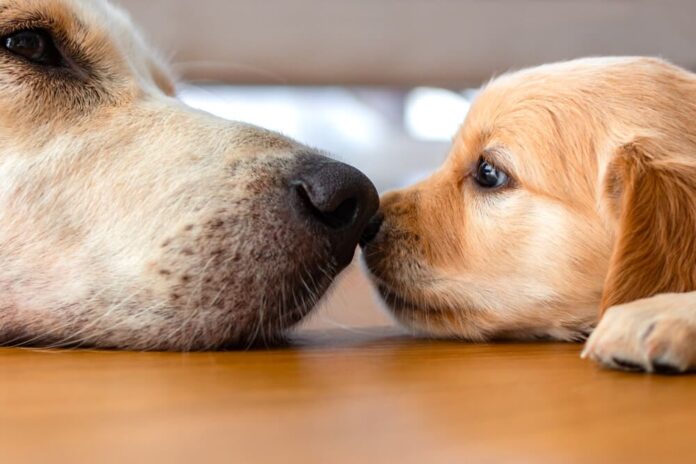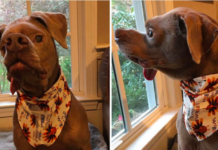Last Updated on October 18, 2023 by Fumipets
Do Dogs Remember Who Their Mother Is?
Dogs are known for their strong emotional bonds, but do they remember who their mother is? The evidence suggests that while dogs might not recognize their biological mother later in life, they do form powerful attachments to their human caregivers. Dogs have an incredible capacity for forming bonds with both their canine and human family members, and the love and care they receive play a significant role in these connections.
Dogs
Most puppies do not stay with their mother for very long. Usually, they are split apart around three months old. But after being separated from their moms, can pups recall their mothers?
Because puppies often depend heavily on their moms for nourishment and protection, dogs may form mother-child bonds very early. Because of this connection, dogs do retain the fragrance of their moms. A dog may retain memories of its parents for up to two years after their separation, according to research.
Here is a succinct conclusion drawn from all available information and studies about a dog’s capacity to recall its mother, pups, and siblings.
Do Dogs Remember Their Mothers?
People of all ages take time in May to remember and celebrate their mothers because they recognize that no love compares to the tie between a mother and child. What about the relationship a mother dog has with her pups, though?
Dogs have a pack structure and are sociable creatures. These beings do not socialize, perceive, or recall life experiences in the same ways that humans do, hence they have quite different concepts of memory.
Others dogs, particularly the mothers, remember their parents, while some don’t.
Compared to a human’s 6 million olfactory signals, a dog’s nose has close to 300 million. This indicates that a dog’s capacity to distinguish between several odors is over 40% stronger than a person’s.
Puppies can detect their mother’s scent before separation and use it to identify them if they reappear.
These creatures can, at best, remember associations between repeated occurrences. However, it aids in their recollection of their favorite things, thus the little period spent together offers mom dogs and her offspring some memory.
Mothers and puppies remember details about one another for over two years. So it stands to reason that if dogs can identify their moms, they can also recall them.
Will Dogs Always Remember Their Mother?
Will dogs remember their moms long after a two-year separation if they can identify and recall them?
A dog may, in fact, retain the memories of its mother from birth until maturity. It does this by identifying a certain fragrance.
An adult dog will spend more time smelling the particular fabric than a random one if you give it a cloth with its mother’s fragrance on it. Again, this is because the material has a familiar feel to it.
Do Mother Dogs Remember Their Puppies?
Although domesticated dogs’ independence may have been constrained by humans, mother nature has nonetheless given mom dogs a way to identify her pups.
After many years, a bitch (female dog) can still identify its children, although this ability has nothing to do with memory.
Because domesticated puppies are seldom given the chance to spend years together as wild dogs, their bond may not be particularly strong. Dogs’ long-term memory is also less developed than that of humans.
But dogs may establish mother-puppy ties because of a biological process called imprinting. Oxytocin, a “love hormone,” is a crucial component of this interaction.
Scent and appearance become psychological triggers for dogs as a result of imprinting. This encourages a bitch and its progeny to feel a feeling of familiarity long after the maternal drive has subsided.
The link and imprint are greater the more favorably vivid the formative experience was (particularly the crucial first two months of their existence).
What Prevents Mother-Puppy Bonding
The duration and quality of a mother dog’s formative phase with her pups have a significant impact on the pups’ capacity to recall their mother. They’d probably develop an enduring relationship if they had been dating for up to four months. Dogs, on the other hand, may also be found in families who were dysfunctional when they were young.
If pups are taken from their moms too soon, it may hinder their capacity to connect. Or if they go through a turbulent atmosphere throughout their impressionable years.
For dogs that have endured traumatic events or harsh environments in their early years, bonding is not always the same. Don’t ponder if a mother and her child will remember one another in the future if a traumatic event shattered their relationship.
Early interruptions will prevent full imprinting if there are many of them. This is due to the fact that early childhood traumas in dogs result in aggressive and antisocial behavior as they age. Dog mothers are known to murder their young when the going gets tough, especially in hunger and predatory situations.

Signs a Dog Remembers Its Mother
There isn’t the usual dog cuddling and welcoming at family gatherings. There are methods for them to express their happiness while meeting one another without squealing or leaping.
1. Relaxed Posture
Check to see whether your dog seems at ease while its mother is around. Co-occurring characteristics include a short tail, erect ears, and a mouth with the tongue dangling.
The puppy may approach another dog with an attentiveness that gives the impression that it is looking about. The alert pup will have a straight horizontal tail, forward-facing ears, enlarged eyes, and a closed mouth. These behaviors indicate that a dog is at ease, content, and highly friendly.
2. Play Bowing
In order to ask another dog to play, a play bowing dog assumes a playful stance. You could see that although the front legs remain down as if bowing, the hindquarters are up.
They briefly bow before bursting into play, running, and leaping. These dogs will continue to wag their tails energetically as if to invite. The tongue generally hangs out of their open jaws.
3. Posture
When your dog approaches a certain pup, pay attention to its posture. You could observe, for instance, when it is deferential to a dominating dog.
A dominant pup will adopt a position that communicates alertness, such as a forward slant and a tall, toe-touching stance with tight legs. The tail will be let out and straight, the ears will point forward, and the lips will curve.
When greeting the dominant dog, another dog will take a submissive stance by rolling onto its back and showing its belly. The obedient dog will tuck its tail. Its lips and eyes will be closed, and its ears will be flat and pointing backward. This indicates that it’s a joyful reunion, and the two may begin performing.
Will Male Dogs Mate with Their Mothers?
Don’t assume that just because mother dogs and their male pups can identify one another, they won’t mate. Even though it makes us uncomfortable to think of a mother dog mating with a male progeny, it is possible for them to get pregnant.
However, it shouldn’t be assumed that they failed to identify each other if a male offspring may mate with its mother during their reunion.
Dogs don’t exhibit the same concept of morals that people do, yet they may be aware of their family ties. While the idea of incest is unpleasant to humans, it is foreign to dogs.
Even if a dog recognizes its mother, they will still mate since there is nothing forbidden about the reunion. Therefore, it is incapable of being stopped from continuing its amorous endeavours by any thinking.
The fact remains that the children born from this union of a mother dog and her male son will have health problems. In order to avoid problems like congenital impairments, dogs should not be crossed with their offspring or siblings.

Conclusion
You now know that a mother dog will identify her pups when they finally reunite in person after a long time apart. To help them recall one another, they’ll utilize their sense of scent.
And if you witness them mating, just remember that dogs are still animals and lack morals in the same way that people do. Incest, taboo, and societal moral restrictions do not thus apply to them.
https://www.youtube.com/watch?v=LMyZETiPy3o
Q&A: Do Dogs Remember Who Their Mother Is?
Do dogs remember their biological mother?
Research suggests that dogs may not remember their biological mother as they do not have a concept of familial relations in the same way humans do.
Do dogs form strong attachments to their human caregivers?
Yes, dogs form deep emotional bonds with their human caregivers, often considering them as the “family.”
Can dogs recognize their littermates later in life?
Dogs may have some recognition of their littermates, especially if they have had extended interactions during their early socialization period.
How do dogs form bonds with their human family?
Dogs form bonds with their human family through affection, care, and shared experiences. They are incredibly responsive to love and positive interactions.
What factors influence a dog’s attachment to its human family?
A dog’s attachment to its human family is influenced by the quality of care, the level of socialization, and the duration of interaction with their human caregivers. Positive experiences and consistent care strengthen these bonds.


















